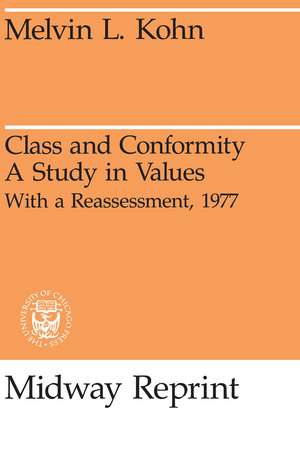Class and Conformity: A Study in Values
Autor Melvin Kohnen Limba Engleză Paperback – 31 aug 1989
First published in 1969 and augmented by the author with a new essay in 1977, Class and Conformity remains a model of sociological craftsmanship. Kohn's work marshals evidence from three studies to show a decided connection between social class and values. He emphasizes that occupation fosters either self-direction or conformity in people, depending upon the amount of freedom from supervision, the complexity of the task, and the variety of work that the job entails. The extent of parents' self-direction on the job further determines the value placed on self-direction for their children; thus, Kohn finds, is the most critical and pervasive factor distinguishing children raised in different socioeconomic classes.
Preț: 387.39 lei
Nou
Puncte Express: 581
Preț estimativ în valută:
74.13€ • 77.59$ • 61.70£
74.13€ • 77.59$ • 61.70£
Carte tipărită la comandă
Livrare economică 01-15 aprilie
Preluare comenzi: 021 569.72.76
Specificații
ISBN-13: 9780226450261
ISBN-10: 0226450260
Pagini: 376
Dimensiuni: 152 x 229 x 28 mm
Greutate: 0.49 kg
Ediția:1
Editura: University of Chicago Press
Colecția University of Chicago Press
ISBN-10: 0226450260
Pagini: 376
Dimensiuni: 152 x 229 x 28 mm
Greutate: 0.49 kg
Ediția:1
Editura: University of Chicago Press
Colecția University of Chicago Press
Cuprins
List of Figures
List of Tables
Preface
Acknowledgments
Reassessment, 1977
List of Tables
Preface
Acknowledgments
Reassessment, 1977
PART I. CLASS, VALUES, AND ORIENTATION
Chapter 1. Introduction
Stability and Change
A Reformulation
Plan of the Book
The Studies
Social Class
Indices of Class
Adequacy of the Hollingshead Index
Chapter 2. Social Class And Parental Values - The Washington Study
Defining and Indexing Parental Values
Class and Values
An Appraisal of the Index of Values
Class, Its Components and Its Correlates
Conclusion
Chapter 3. A Cross-National Comparison - The Turin Study 39
Nation, Class, and Values
The Relationship of Self-Control to Obedience
Conclusion
Chapter 4. The Generality of the Relationship - The National Study
Revised Index of Parental Values
Class and Values
The Age and Sex of the Child
Dimensions of Valuation
Other Major Lines of Social Demarcation
Demographic Divisions
Family Structure and Process
The Combined Effects of All Social Variables
Conclusion
Chapter 5. Orientations to Work, Society, and Self
Values for Self
Judgments about Work
Orientation to Society
Self-Conception
Age and Interview Effects
The Generality of the Class Relationships
Conclusion
PART II. VALUES AND BEHAVIOR
Chapter 6. Misbehavior and Punishment
Mothers' Use of Punishment
Fathers' Use of Punishment
An Appraisal of the Data
Conclusion
Chapter 7. Role-Allocation
The Support Dimension in Parent-Child Relationships
The Constraint Dimension
The Relevance of Constraint in Appraisals of the Supportiveness
of Father-Son Relationships
Patterns of Role-Allocation
Conceptions of Mothers' and Fathers' Proper Roles
Conclusion
PART III. AN INTERPRETATION
Chapter 8. Class, Its Components, and Its Attendant Conditions
Discrete Classes or a Continuous Hierarchy?
Dimensions of Social Class
Class Origins and Social Mobility
Conclusion
Chapter 9. Occupational Self-Direction and Parental Values
Occupational Self-Direction
Logic of the Inquiry
Evidence from Turin
Evidence from the National Study
Conclusion
Chapter 10. Class, Occupation, and Orientation
The Relationship of Occupational Self-Direction to Values and
Orientation
Other Facets of Occupation
The Relevance of Occupational Conditions for Explaining the
Class Relationships
The Relevance of Occupational Self-Direction to the
Components of Social Class
Conclusion
Chapter 11. Class and Conformity: An Interpretation
Values and Behavior
APPENDIXES
Appendix A. Methods of the Washington Study
Interviewers
Field Work Procedures
Nonrespondents: Sample where Only Mothers Were to be
Interviewed
Nonrespondents: Sample where Mother, Father, and Child
Were to be Interviewed
Processing of Data
Interview Schedule: For Parents
Appendix B. Methods of the Turin Study
Preparation of the Interview Schedule
Sample Selection
Field Work Procedures
Processing of Data
Index of Social Class
Interview Schedules
Appendix C. Methods of the National Study
Dimensions of Occupation
Sample
Development of the Interview Schedule and Administration of
the Survey
Nonrespondents
Processing of Data
Interview Schedule
Appendix D. Indices of Self-Conception and Social Orientation
Appendix E. Classifications of the Complexity of Work
Complexity of Work with Data
Complexity of Work with Things
Complexity of Work with People
Overall Complexity of the Job
Bibliography
Index











